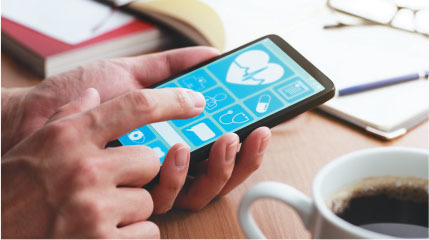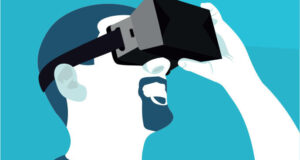
There’s an App for That
Digital technologies are electronic tools, systems, devices and resources that generate, store or process data. Social media, online games, multimedia, patient portals and “apps” are just a few examples on how healthcare has leveraged digital technologies. Digital technology links to digital learning, which is any type of learning that uses technology. Digital technology is an excellent patient engagement tool that is growing exponentially.
Mobile apps can be a useful tool for provider education, patient self-management, education and reporting. Using heart failure as an example, Athilingam & Jenkins’ (2018) review of available apps at the time, specific to heart failure management, noted that there were 26 validated apps available. They noted that apps demonstrated “trends towards making an impact and offer a potentially cost-effective solution with 24/7 access to symptom monitoring as a point of care solution, promoting patient engagement in their own home care” (Athilingham & Jenkins, 2018, p.1).
My own quick search, completed on 8/2/22 on the Apple App Store and Google Play, found more than 100 heart failure apps with four-star and greater reviews available on both stores. I have pulled a few to demonstrate the different uses for them (no endorsement, just as example).
- PROVIDER TOOL: practice guidelines, databases, tools for the healthcare provider.
a. MYHFCPG: a quick clinical practice guidelines reference for heart failure management. This includes flowcharts and risk calculators to assist the practitioner in patient management.
b. ACC Guideline Clinical App: The American College of Cardiology’s app, which includes clinical guideline recommendations and tools to care for patients with a wide array of cardiac diagnoses.
- PATIENT FACING: symptom trackers, can interface with other apps or patient portals to provide “real-time” patient data to providers.
a. Heart Failure Manager: This patient-facing app integrates with the Apple “Health” app and allows data to be sent daily to the patient’s care team. This app tracks patient perspectives in how they feel, activity levels, heart failure symptoms, appointment reminders and a journaling feature.
- PATIENT ROLE PLAYING GAME/PATIENT ENGAGEMENT: gives patients an opportunity to role play and practice decision making.
a. Heart Failure Coach: This app, developed by the University of Pennsylvania Medical Center, is a patient engagement game where players manage the lifestyle choices of the game’s main character, who was recently released from the hospital after a diagnosis of heart failure. Outcomes are determined by choices made throughout the first week post-hospitalization period (good self-management versus hospital readmission). This helps to reinforce patient education and self-management skills in a fun, non-threatening way. - PORTALS: connect to hospital or practice electronic medical records for quick reference to test results and electronic communication to providers, from appointment scheduling and bill payment to medication management and quick text message conversations with providers.
Take a look at what tools may be available for your population and take the opportunity to familiarize yourself with them and teach your patients how to use them (see CMSA Standards of Practice, Standard H: Health Information Technology, 2022).
Please see my opening message for this issue for caveats of technology use and the need to assess patients/caregivers for ability to use or potential for overload.
REFERENCES
@Point of Care. (2020). Heart Failure Manager (Version 10.8.3) [Mobile app]. Apple App Store. https://apps.apple.com/us/app/heart-failure-manager/id1364043356.
American College of Cardiology. (2021). ACC Clinical Guidelines (Version 3.5) [Mobile app]. Apple App Store. https://www.acc.org/tools-and-practice-support/mobile-resources/features/guideline-clinicalapp#:∼:text=The%20ACC’s%20Guideline%20Clinical%20App,formats%20on%20a%20mobile%20platform
Athilingam, P., & Jenkins, B. (2018). Mobile Phone Apps to Support Heart Failure Self-Care Management: Integrative Review. JMIR cardio, 2(1), e10057. https://doi.org/10.2196/10057.
Bbwebsolutions. (2022). MYHFCPG (Version 1.1.0) [Mobile app]. Google Play Store. https://play.google.com/store/apps/details?id=com.myhfcpg.cpg1&hl=en_US&gl=US.
Etcetera Edutainment, Inc. (2020). Heart Failure Coach (Version 3.2.2) [Mobile app]. Google Play.https://play.google.com/store/apps/details?id=com.simcoachgames.heartfailurecoach&hl=en_US&gl=US.





